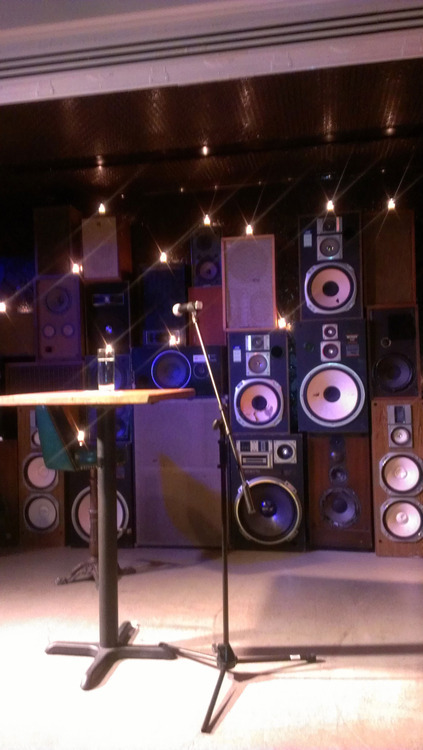
On Thursday night, on the eve of Pussy Riot’s sentencing, I attended a reading in their honor at New York’s Ace Hotel, a free event organized on short notice by JD Samson, of MEN and Le Tigre, and historian Robert Lieber. Although I’m just a lowly archivist moonlighting for the Believer, I was given a press pass, whisked to the front of the line, and sequestered in a sort of VIP holding pen. This only heightened the contrast between the artisanal-boutique ambience of the Ace and the radical actions of the women whose words we’d come to hear. Once we were escorted to the Ace’s basement performance space and seated in our special section, the journalists seemed to take up half the room. Ironically, this privileged spot cut me off from a lot of the background action, which I heard about only later: the open bar, the confused tourists trying to make it past the event’s doorman, and the apparently hundreds of attendees who couldn’t get in. But I had a great view of the MTV newscaster and her cameraman reporting near the stage as we waited in the stifling heat.
The event began without preface or introduction with Karen Finley’s reading of “Punk Prayer: Virgin Mary, Put Putin Away,” the very song whose performance at Moscow’s Cathedral of Christ the Savior in February landed three members of the Pussy Riot collective in jail. The line “Virgin Mary, Mother of God, become a feminist, become a feminist, become a feminist” elicited the first mass cheer from a largely young, white, female audience, as did all later references to feminism. While Finley’s readings sometimes verged on the parodic, those by Johanna Fateman, Mx Justin Vivian Bond, Eileen Myles, and Masha Gessen captured the earnest quality of much of the writings by the imprisoned Maria Alekhina, Nadezhda Tolokonnikova, and Yekaterina Samutsevich. K8 Hardy conveyed the rage and irony of the more-performative pieces, while the night’s most talked-about guest, Chloe Sevigny, limited herself to a single letter from prison. Despite the heat and the length of the event, the crowd (many standing) was attentive. The texts, which included lyrics, opening statements, and each woman’s closing statement, were a sophisticated mash-up of ideas and ideologies: the most cited source was the Bible, but there were shout-outs to Debord, Montaigne, Kafka, Dostoyevsky, and Foucault.
The event’s power lay in its focus on the texts, which provided a corrective to the spectacular tendencies of the trial’s coverage. “Pussy Riot does not want to focus attention on girl’s appearances, but creates characters who express ideas,” read a line from Alekhina; and yet it has been hard not to be seduced by the Riot Grrrl inspired vintage dress/bright tights/balaclava anti-uniform of Pussy Riot. The texts made clear the extent to which the aesthetic package—the outfits and performances—is an actual threat to the Russian political order, as evidenced in selected court statements from the prosecution, including that of a guard whose exposure to the Cathedral of Christ the Savior performance had left him “traumatized.” But this savvily engineered aesthetic cannot be separated from the women’s complex rhetoric.
As the founder of the Riot Grrrl Collection at New York University’s Fales Library, I see some of the same contradictory complexities in Pussy Riot that characterized the Riot Grrrl movement in the early ‘90s: the vintage, deconstructed, uber-feminine fashion; the deceptively simple musicality; the audacious and intelligent writing; and a feminism that is part and parcel of a larger call for revolution. Like Riot Grrrl, Pussy Riot invokes the slogan “The personal is political,” but the stakes of self-expression are much higher for them.
The Ace Hotel event was not perfect. Critics objected to the bourgeois setting, the lack of space, and the all-white cast of readers. Some questioned the point of having such a reading, and of other attempts to “bring attention to” Pussy Riot, especially at the expense of other political prisoners both in America and abroad. But I did not take it as primarily a PR stunt. For me, it was a chance to be attentive, to hear the words. In her closing statement, Tolokonnikova stated, “We are here only as decorations, inanimate elements, mere bodies that have been delivered into the courtroom.” To listen to the texts felt like a small gesture to counteract this objectification.
Immediately after the readings, a woman led the audience in a mic check outlining the plans for protest the following day. It felt like most of the audience was ready to take immediate action; in the words of Tolokonnikova, “Philosophers should not merely describe the world, but change it.”
—Lisa Darms
(Photo by Bil McMillian)




